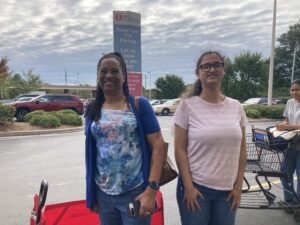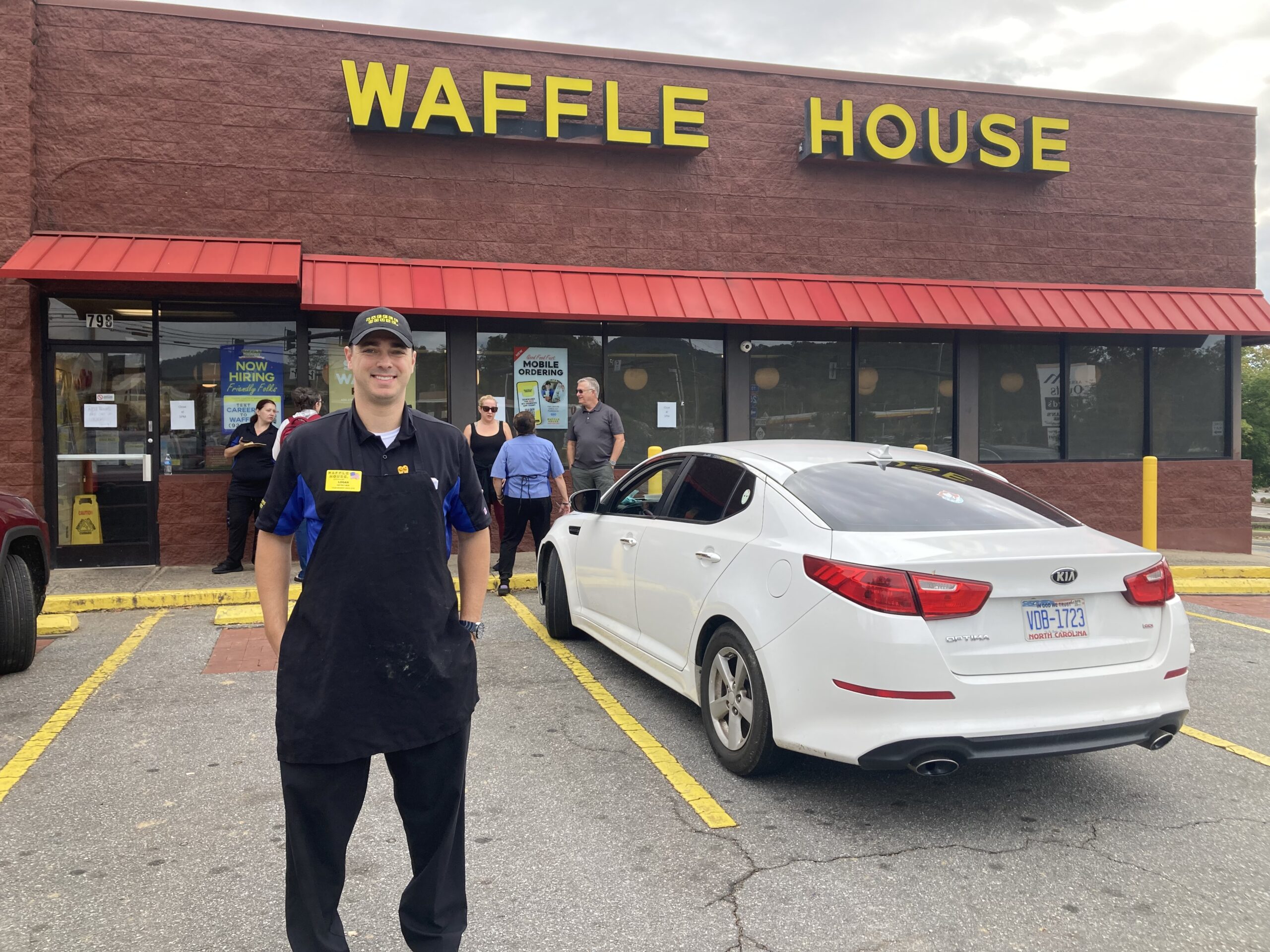By Catherine Komp, Engagement Director
A steady stream of locals, travelers and emergency personnel fill the parking lot of Waffle House in South Asheville. The familiar golden yellow lights have continued to glow, and jump teams from Raleigh, Atlanta and other locations have somehow gotten here to help keep the restaurant open.
Logan Craig is District Manager for Waffle House South Asheville. Earlier this week, they were in Code Yellow of the FEMA Waffle House Index, which means half-capacity and to-go orders only.
“Saturday the CEO of Waffle House flew here to this store,” said Craig. “He’s been flying food in his jet to the Asheville airport. We’re feeding all the FEMA workers that you see out here. We’ve just been loading up, serving a lot of food, a lot a lot of food.”
Craig’s been working nonstop since Saturday. His own home wasn’t damaged but with no power or water, his wife took their six-month-old baby to stay with relatives.
“We didn’t know how bad it was going to be so when I saw the destruction, I said you got to get out of town now ‘cause this is going to last at minimum a week, probably. So they’re safe, everybody’s safe, we’re good. I’m just in survival mode right now,” said Craig.
Waffle House is one of the few places still serving food on this commercial strip off I-26 on Brevard Road, about 15 minutes from downtown Asheville. The restaurant sits on the edge of the Outlet Mall’s sprawling parking lot, which has transformed into a hub for emergency response. There are dozens of power trucks, tree-cutting crews and a large contingent from Disaster Resource Group, which brought in rows and rows of mobile living quarters for its staff.

Nearby is the Comfort Suites hotel, which also had power and was housing some of the emergency personnel along with displaced residents and travelers. A family of five checks in and requests an extra blanket, while a man in blue overalls asks about extending his stay. Manager Heather Mallette says everything was running smoothly until Sunday when the water ran out.
“As of right now we’re serving what food we have left, because we can’t cook, so bagels, muffins, yogurt. We’re serving what we have until it runs out, which might be tomorrow,” said Mallette. “And people are using buckets of water from the pool to flush their toilets. So that’s how we’re running right now as long as we can.”
Mallette lives 15 minutes away, on a normal commute. When she lost power and water at her house, she packed up with her husband and daughter and moved into the hotel. About half of the staff is staying there, including Andrea Bouknight.
“We’re doing our best to keep our guests safe here. We’d rather them be here with no water, than be traveling. We’re just like a family here, loving on everybody and getting them in safely,” said Bouknight.
With cell reception down all over the region, word-of-mouth was a primary way to share news and information, from different parts of Asheville and outside the city. One person came up to the front desk to show some photos of Fairview and Chimney Rock that loaded into his Facebook feed when he had service. The small images, which wouldn’t open with the limited service, gave a glimpse of the destruction that so many in Asheville haven’t been able to see during the communication blackout.
“We don’t have phone, internet, anything here. So I still don’t know what’s going on out there. It’s all people coming through, giving information about what they’ve seen, what they’ve experienced, that’s how we’re getting information right now,” Mallette said.
When you don’t have information, added Bouknight, “that’s what makes it kind of scary.”
“It would be better if we knew what was going on. I know we don’t know a time frame, but if we just had a little more information. We’re just in the dark,” said Bouknight, who also is helping care for her 10-day-old granddaughter.
Across the street, Ingles grocery store was one of the few that still had power in the days after the storm. After record crowds on Saturday, management organized a system limiting the number of people in the store to make the shopping experience more orderly and cut wait times that had stretched more than two hours to check out.

In a line of several dozen people outside was Asheville City Schools staffer Carol Smith-Hill, who was staying in the hotel next door. Her home near the River Arts District was not damaged, but like huge swaths of the city, they had no power or water. She’s also a caregiver for her 95-year-old father. Smith-Hill was in good spirits, and relieved to finally reach loved ones.
“Out here I’m getting a signal, I talked to my son. He can only get a signal when he goes out to Mills River and then he can call me and talk to me,” said Smith-Hill. “We talked for the first time yesterday, he’s like ‘Mom! Mom! Mom! You’re okay!’”
Smith-Hill was hoping to get some fruit, maybe apples and bananas. A store manager said while they were out of water, milk, meat, charcoal and other in-demand products, they did have some items like cereal, peanut butter and new deliveries of bread, which they are limiting to two per customer. The store, like most of those open in the city, was also cash-only.
Traveling by bike through the parking lot was Monica Preston, who lives in the nearby apartment complex. Staff there turned the clubhouse into a hub for information, providing internet access and a radio to hear the news.
“Everybody’s been able to connect at the clubhouse, where we are sitting and talking and everybody is sharing stories. We have a pool, so everybody cooks out there. We have a couple grills,” said Preston.
Preston also has a home in Florida, but she came up here to try to avoid Helene. Now, she’s anxious to get back.
“Next time, Asheville should be more prepared for this hurricane because they were not prepared for this at all,” said Preston. “In Florida, we are very prepared for all these hurricanes and storms. Here people are not prepared for anything whatsoever. So I think they have to be prepared for next time.”



